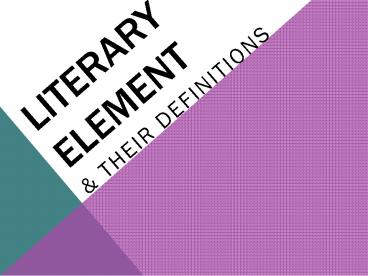Literary element - PowerPoint PPT Presentation
1 / 84
Title:
Literary element
Description:
LITERARY ELEMENT & THEIR DEFINITIONS A theme is a comment on life, a description of how people act not how they should act and the effects their actions have upon ... – PowerPoint PPT presentation
Number of Views:169
Avg rating:3.0/5.0
Title: Literary element
1
Literary element
- their definitions
2
antagonist
3
a character or force in conflict with a main
character, or protagonist
4
- Character
5
a person or animal that takes part in a narrative
(story)
6
- Characterization
7
- The act of creating or developing a character
through - Appearance and personality
- Speech and behavior
- Thoughts and feelings
- Opinions of others
8
- Climax
9
the high point of interest or suspense in a
story also called the turning point
10
- Conflict
11
a problem or struggle between opposing forces
can be internal or external
12
- Exposition
13
Mr. Green the banker Mrs. Scarlet the loan
officer Where in the Living Room When at
midnight What fight with the candlestick
introduces the characters, setting, and basic
situation
14
- Falling Action
15
the events of a narrative following the climax,
leading to the resolution
16
- Flashback
17
a scene within a story that interrupts the
sequence of events to relate events that happened
earlier
18
- Foreshadowing
19
an authors use of hints or clues to hint about
future events
20
- Inciting Incident/
- Initiating Event
21
the first event it gets the ball rolling
22
- Irony
23
the opposite of what is meant a contradiction
between what happens and what is expected
24
- Mood
25
the feeling created in the reader by a literary
work or passage
26
- Motive/
- Motivation
27
the reason that explains a character's thoughts,
feelings, action, or speech
28
- Plot
29
the sequence of events in a narrative (story)
30
- Point of View
31
1st person, narrator is a character in the story
uses pronouns I, me, and myself
3rd person , the narrator is not a character in
the story uses pronouns he or she
3rd person, omniscient, an outsider who can enter
the mind/s of one or more characters
the perspective the narrator is telling the story
32
protagonist
33
the main character in a literary work
34
- Rising Action
35
the events that lead to the climax increasing
the the interest or suspense
36
- Resolution
37
the end or outcome of the conflict in a plot
38
- Setting
39
the time and place of the action of the story
40
- Theme
41
central message, concern, or purpose of a story
42
- Alliteration
43
- repetition of beginning
- consonant sounds
44
- Allusion
45
a reference to a well-known person, place, event,
literary work, or work of art
46
- Figurative language
47
- does not mean exactly what
- you say a meaning other
- than the ordinary meaning
48
- Hyperbole
49
- exaggeration that is obvious
- and intentional
50
- Idiom
51
- common expression that
- doesnt make sense if taken
- literally
52
- Literal
- language
53
- means exactly what you say
54
- Metaphor
55
- compares two unlike things
- without the use of like or as
56
- Onomatopoeia
57
- uses words that imitate
- sound
58
- Personification
59
- an object or nonhuman
- subject is given human
- characteristics
60
- Simile
61
- a direct comparison
- between two unlike things
- using the words like or as.
62
- Symbol
- Symbolism
63
- anything that stands for or
- represents something else
64
- Tone
65
the authors attitude toward the audience and
subject
66
THE END
67
Charactertraits
68
the qualities, attitude, and values that a
character has or displays
69
- Dialogue
70
a conversation between characters.
71
- Subplot
72
a story in a novel or film that is separate from
the main story and is not as important as the
main story
73
- Inference
74
R E A D I N G
a conclusion drawn by the reader from reading
between the lines by using prior knowledge and
text
75
- Parallel
- Episode
76
certain elements of the plot are repeated
77
- Imagery
78
-pumpkin patch
-sun baked backs
- an author uses words and phrases to create
mental images for the reader
79
- Suspense
80
a feeling of anxious uncertainty about the
outcome of events in a literary work
81
Short story
82
a brief work of fiction which presents a sequence
of events or plot
83
fiction
84
literary work based on the imagination, not fact































